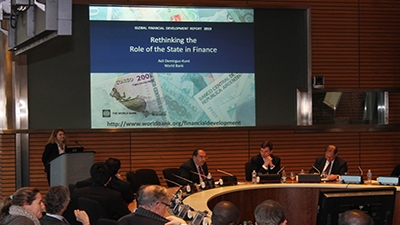The emerging markets are in turmoil. Stocks and currencies are falling. Global investors are pulling money out of stocks and bonds. Is another crisis looming?
To answer that question, the World Bank in February held a panel discussion led by authors of three books examining lessons learned from financial crises. Mahmoud Mohieldin, World Bank Group president’s special envoy, said the three books can help policy makers examine the current turmoil affecting emerging markets, along with the hypothetical diagnoses proposed by some commentators: distorted asset prices, questionable growth foundations, human behavior, and overborrowing by households and the private sector.
“The underlying cause is the structural problem in the financial system, which distorts incentives to rational human behavior, generates excessive credit growth, distorts prices, and results in overstretched balance sheets,” said Asli Demirguc-Kunt, the World Bank’s research director and co-author of a report, the Global Financial Development Report 2013: Rethinking the Role of the State in Finance.
The report, drawing on several new global surveys and unique country-level data covering 205 economies since 1960s, calls for a reexamination of the state’s role in the financial sector. The report’s overall message is cautionary. Government involvement in the financial sector helps maintain economic stability, support economic growth and create jobs in the short run, especially in times of crisis. But in the long run, governments may need to get less involved in some areas, while strengthening their hand in ensuring good supervision, healthy competition and better access to financial services.
State banks in Brazil, for example, aren’t efficient in allocating credits. Although their ability to absorb failed banks lessened the stress on the system during the current market turmoil, that came at a significant long-term cost in terms of inefficient and politicized lending, said Charles W. Calomiris, the Henry Kaufman professor of financial institutions at Columbia University and co-author of a new book, Fragile by Design: The Political Origins of the Banking Crises and Scarce Credit.
Looking at why banking systems are unstable in some countries but not in others, his book shows that the pattern of chronic banking crises and scarce credit results from complex political bargains made between politicians, bankers, bank shareholders, depositors, debtors, and taxpayers. Several countries, such as Singapore and Canada, have stable banking systems that provide abundant credit. He said that may be because they are either politically homogeneous or democracies with a history of anti-populist constitutions. Other countries, such as the U.S., have a history of recurrent financial crises, which reflects historical circumstances and a constitution that permits greater populist control of the banking system.

